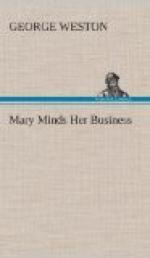“How he must love his work!” she thought, and couldn’t help wondering what accidental turn of life had guided his career into the field of figures.
“How interesting he makes it!” she thought again. “Why, it’s almost like a novel.”
Brilliant sentences illuminated nearly every page. “This system, admirable in its way, is probably a legacy from the past, when the bookkeepers of Spencer & Son powdered their hair and used quill pens.—” “Under these conditions, a stock clerk must become a prodigy and depend upon his memory. When memory fails he must become a poet, for he has nothing but imagination to guide him.” “Thus one department would corroborate another, like two witnesses independently sworn and each examined in private—”
The back of the volume, she noticed, was filled with tables of figures. “This won’t be so interesting,” she told herself, turning the leaves. But suddenly she stopped at one of the open pages—and read it again—and again—
“Comparative Efficiency of Men’s Labour and Women’s Labour,” the sheet was headed. And there it was in black and white, line after line, just how much it had cost to make each Spencer bearing when the men did the work, and just how much it was costing under the new conditions.
“There!” said Mary, “I always knew we could do it, if the women in Europe could! There! No wonder we’ve been making so much money lately—!”
She took the report home in triumph to show to her aunts, and when dinner was over she carried the volume to her den, and never a young lady in bye-gone days sat down to Don Juan with any more pleasurable anticipation than Mary felt when she buried herself in her easy chair and opened that report again.
She was still gloating over the table of women’s efficiency when Hutchins appeared.
“Mr. Archibald Forbes is calling.”
Archey had news.
“The men had a meeting this afternoon,” he said. “They’ve been getting up a big petition, and they are going to send another committee to Washington.”
“What for?”
“To press for that boycott. Headquarters put them off last time, but there are so many men out of work now at other factories that they hope to get a favourable decision.”
“I’ll see Judge Cutler in the morning,” promised Mary, and noticing Archey’s expression, she said, “Don’t worry. I’m not the least alarmed.”
“What bothers me,” he said, “is to have this thing hanging over all the time. It’s like old What’s-his-name who had the sword hanging over his head by a single hair all through the dinner.”
The sword didn’t seem to bother Mary, though. That comparative table had given her another idea—an idea that was part plan and part pride. When she reached the office in the morning she telephoned Judge Cutler and Uncle Stanley.
“A directors’ meeting—something important,” she told them both; and after another talk with the accountant she began writing another of her advertisements. She was finishing this when Judge Cutler appeared. A minute later Uncle Stanley followed him.




